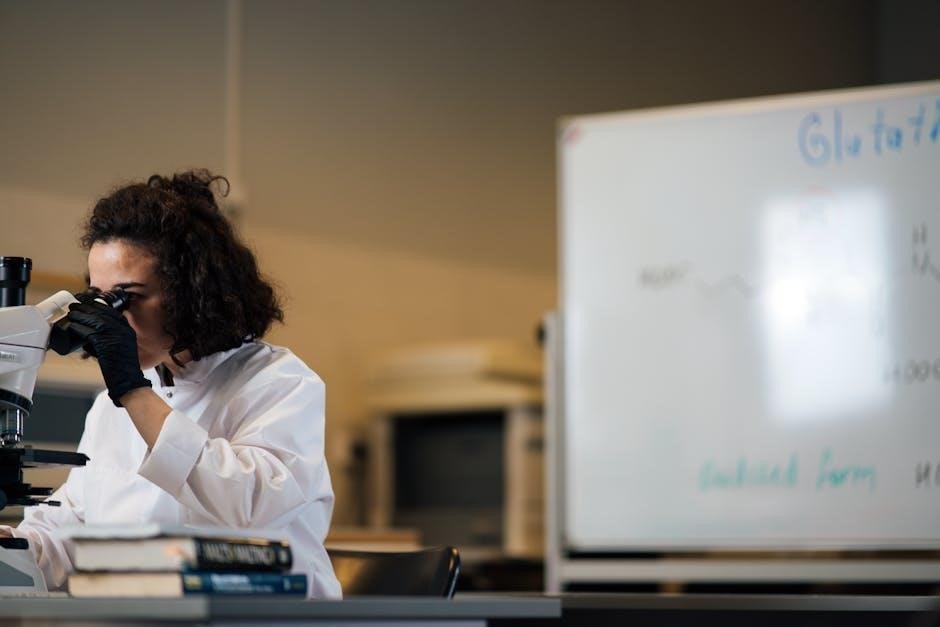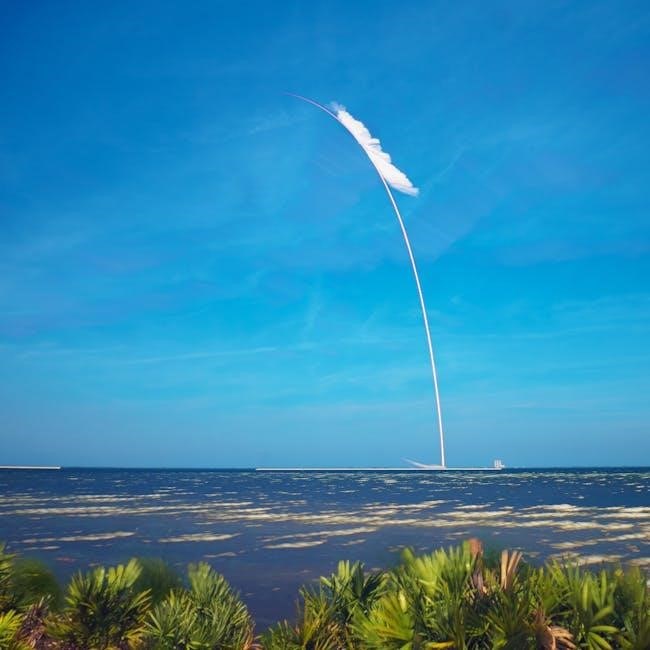The AICE Marine Science course explores the fascinating world of oceanography, ecology, and conservation. This interdisciplinary program develops critical thinking and scientific literacy, preparing students for careers in environmental science. The textbook provides a comprehensive guide, covering essential concepts and practical applications, enabling students to engage with marine ecosystems and global challenges effectively.
Overview of the AICE Program
The AICE (Advanced International Certificate of Education) program is a rigorous, pre-university curriculum designed for students in the upper secondary school. It emphasizes in-depth study of specialized subjects, fostering critical thinking, independent learning, and academic excellence. The Marine Science component integrates biology, chemistry, and environmental science, providing a holistic understanding of marine ecosystems and conservation. The program is structured to prepare students for university-level coursework, with a strong focus on practical skills and real-world applications. By combining theoretical knowledge with hands-on experiments and fieldwork, AICE Marine Science equips students to address global environmental challenges effectively. This comprehensive approach ensures students develop both intellectual curiosity and a commitment to sustainability, making it an ideal pathway for those passionate about marine conservation and environmental stewardship.
Importance of Marine Science in the Curriculum
Marine Science is a vital component of modern education, offering insights into the Earth’s largest ecosystem. It fosters an understanding of oceanography, marine biodiversity, and environmental conservation, which are critical in addressing global challenges like climate change and sustainability. By incorporating Marine Science into the curriculum, students gain a deeper appreciation for the interconnectedness of marine and terrestrial ecosystems. This subject also promotes interdisciplinary learning, blending biology, chemistry, and ecology to provide a comprehensive perspective. Furthermore, it encourages students to think critically about human impacts on marine environments, empowering them to contribute to solutions for environmental issues. The inclusion of Marine Science in the curriculum prepares the next generation to navigate the complexities of ocean conservation and sustainable resource management, ensuring a more informed and responsible approach to environmental stewardship.

Key Features of the AICE Marine Science Textbook
The AICE Marine Science textbook is a comprehensive resource, featuring detailed chapters on marine ecosystems, human impacts, and conservation. It includes practical exercises, case studies, and vibrant imagery to enhance understanding, while its structured format ensures a logical progression of topics, preparing students for rigorous academic and practical challenges in marine science.
Structure and Organization of the Textbook
The AICE Marine Science textbook is meticulously organized to ensure a logical progression of learning. It begins with foundational concepts, such as marine ecosystems and biodiversity, before advancing to complex topics like human impact and conservation. Each chapter is divided into clear sections, incorporating diagrams, graphs, and real-world case studies to enhance understanding. Practical exercises and laboratory investigations are integrated throughout, aligning with AICE exam requirements. The textbook also includes supplementary materials, such as a workbook, to reinforce key concepts and skills. This structured approach ensures students can systematically build their knowledge, develop practical skills, and prepare effectively for assessments. The clarity and coherence of the textbook make it an essential resource for both classroom learning and independent study.
Specialized Chapters and Topics Covered
The AICE Marine Science textbook encompasses a wide range of specialized chapters, each focusing on distinct aspects of marine science. Chapters 6–9 delve into advanced topics such as coral reef ecology, deep-sea environments, and the impacts of climate change on marine life. The textbook also explores human activities like overfishing, pollution, and coastal development, highlighting their effects on marine ecosystems. Additionally, it covers conservation strategies, including marine protected areas and sustainable fishing practices. Practical fieldwork and laboratory experiments are emphasized, providing students with hands-on experience. Supplementary resources, such as workbooks and online tools, further enhance learning. This comprehensive approach ensures students gain a deep understanding of both theoretical and practical aspects of marine science, preparing them for advanced studies and real-world challenges.

Core Concepts in Marine Science
The textbook covers fundamental topics such as marine ecosystems, biodiversity, and the impact of human activities on coastal and open ocean environments. It emphasizes conservation strategies and the scientific method to understand these complex systems, providing a solid foundation for advanced study in marine science and related fields.
Marine Ecosystems and Biodiversity
Marine ecosystems are complex and dynamic, supporting a vast array of biodiversity. The textbook explores coral reefs, estuaries, and deep-sea trenches, highlighting their unique species and ecological roles. Key concepts include trophic levels, food webs, and the importance of keystone species in maintaining ecosystem balance. Students learn about the adaptations of marine organisms, such as bioluminescence and osmoregulation, and the challenges posed by climate change, overfishing, and pollution. Case studies illustrate the interconnectedness of marine life and the impact of human activities on these fragile environments. The chapter emphasizes the importance of conservation efforts to protect endangered species and restore degraded habitats, ensuring the sustainability of marine ecosystems for future generations.
Human Impact on Marine Environments
Human activities significantly influence marine environments, often leading to detrimental effects. Pollution, overfishing, and coastal development disrupt marine ecosystems, threatening biodiversity. Plastic pollution, oil spills, and agricultural runoff introduce harmful substances, damaging habitats and species. Overfishing depletes fish populations, destabilizing food webs and economies reliant on fisheries. Coastal development destroys mangroves and coral reefs, which protect shorelines and nurture marine life. Climate change exacerbates these issues by acidifying oceans and raising temperatures, affecting species survival and ecosystem balance. The textbook highlights the urgent need for sustainable practices, such as marine protected areas and reduced plastic use, to mitigate these impacts and preserve marine health for future generations. Understanding these challenges is crucial for developing effective conservation strategies.

Skills Developed Through the Textbook
The textbook enhances scientific inquiry, critical thinking, and problem-solving abilities. Students develop skills in data analysis, experimentation, and applying marine science concepts to real-world challenges.
Scientific Inquiry and Research Methods
The AICE Marine Science textbook emphasizes the development of scientific inquiry and research skills. Students learn to design experiments, collect and analyze data, and interpret results. The textbook provides guidance on formulating hypotheses, conducting fieldwork, and understanding statistical methods. Practical exercises encourage students to apply scientific principles to real-world marine scenarios. By engaging with case studies and research projects, learners develop critical thinking and problem-solving abilities. The curriculum also highlights the importance of ethical research practices and the responsible use of technology in marine science. These skills prepare students to contribute effectively to marine conservation and environmental management, fostering a deeper understanding of ocean ecosystems and human impacts. The textbook’s structured approach ensures students gain proficiency in evidence-based reasoning and scientific communication.
Practical Laboratory and Fieldwork Skills
The AICE Marine Science textbook places a strong emphasis on developing practical laboratory and fieldwork skills. Students engage in hands-on activities, such as water quality analysis, marine organism dissection, and ecosystem sampling. The textbook provides detailed procedures for conducting experiments, using specialized equipment like microscopes and water testing kits. Fieldwork exercises, including beach surveys and species identification, enable students to apply theoretical knowledge in real-world settings. These activities foster observational, analytical, and technical skills, essential for marine science professionals. The textbook also encourages the use of technology, such as GPS and data loggers, to enhance fieldwork accuracy. By integrating laboratory and fieldwork, the curriculum prepares students for independent research and collaborative projects, equipping them with the practical expertise needed for careers in marine conservation and environmental science.
Resources and References
The AICE Marine Science textbook offers supplementary materials, including online resources, interactive tools, and reference guides. These support comprehensive learning and teaching, enhancing student engagement and understanding.
Supplementary Materials for Students
The AICE Marine Science textbook is complemented by a range of supplementary materials designed to enhance student learning. These include downloadable PDF workbooks, interactive digital tools, and online resources. The workbook provides practical exercises, case studies, and review questions to reinforce key concepts. Additionally, interactive tools such as virtual labs and data analysis software enable students to explore marine ecosystems and processes in depth. Online resources offer access to video tutorials, scientific articles, and study guides, catering to diverse learning styles. These materials are tailored to support exam preparation, critical thinking, and independent study, ensuring students have everything they need to excel in the course. They also encourage engagement with real-world marine science issues, fostering a deeper understanding of the subject.
Online Resources and Tools for Marine Science
Students studying AICE Marine Science can access a variety of online resources and tools to enhance their learning experience. These include virtual labs, interactive simulations, and real-world data analysis software. Websites such as NOAA’s Ocean Explorer and marine conservation organizations provide up-to-date information on marine ecosystems and current research. Additionally, online platforms offer interactive tutorials, video lectures, and downloadable datasets for hands-on practice. These tools are designed to supplement the textbook and provide students with practical skills in data interpretation and scientific inquiry. Many resources are accessible via mobile devices, making it easy for students to study anywhere. By leveraging these online tools, students can deepen their understanding of marine science concepts and stay engaged with the subject matter. They also support independent learning and preparation for assessments;
Assessment and Exam Preparation
The AICE Marine Science exam evaluates understanding of core concepts through structured questions and practical assessments. Students should focus on research methods and data analysis. Regular revision and past papers are essential for effective preparation.
Exam Format and Requirements
The AICE Marine Science exam is a handwritten assessment that evaluates students’ understanding of key concepts and practical skills. It includes multiple-choice questions, short answers, and extended responses, requiring detailed explanations and data analysis. The exam covers chapters such as the scientific method, marine ecosystems, and human impacts on the environment. Students are expected to apply knowledge from the textbook to real-world scenarios and demonstrate critical thinking. Prior completion of a biology or marine science course, equivalent to Cambridge IGCSE, is recommended for success. The exam also assesses the ability to interpret scientific data and propose solutions to environmental challenges, emphasizing research methods and experimental design.
Revision Strategies and Tips
Effective revision for AICE Marine Science involves a structured approach to master key concepts and practical skills. Students should create a study schedule, focusing on weak areas and reviewing notes regularly. Utilize the textbook’s supplementary materials, such as workbooks and online resources, to reinforce learning. Practice past exam papers to familiarize yourself with the format and improve time management. Active learning techniques, like summarizing notes and teaching concepts to others, enhance retention. Join study groups to discuss complex topics and gain new insights. Regularly review scientific methods and case studies to build confidence. Focus on understanding rather than memorization, and seek clarification on doubts early. Consistent revision and active engagement with the material are key to achieving success in the AICE Marine Science exam.